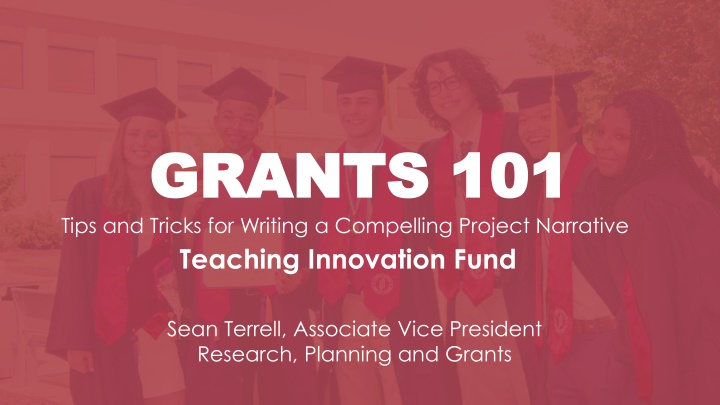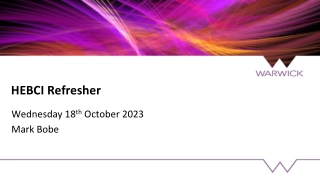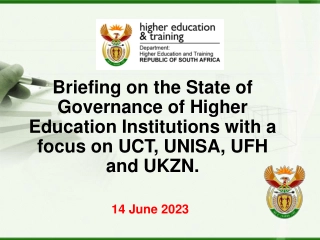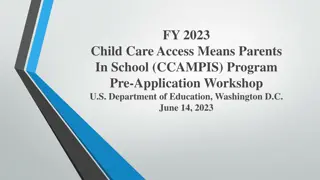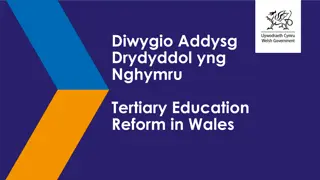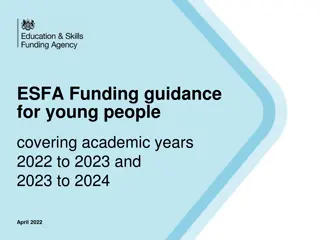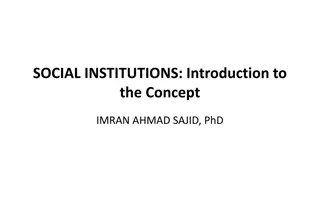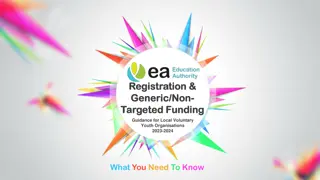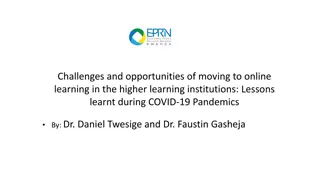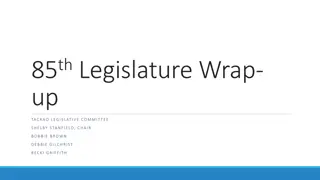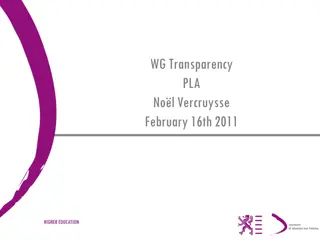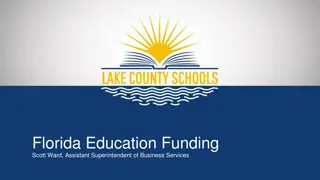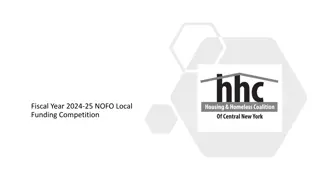Maximizing Funding Opportunities for Higher Education Institutions
Grants play a crucial role in expanding educational opportunities and services for students in higher education institutions. They provide essential funding for new programs, research, scholarships, capacity building, technical assistance, and student support. Research, Planning, and Grants assist in identifying grant opportunities aligned with institutional priorities, developing compelling project narratives, and ensuring compliance with grant requirements. Federal and state grants serve as seed funding for innovative projects and interventions that benefit communities and stimulate economic growth. Understanding the key players in the grant landscape, such as the US Department of Education and National Institutes of Health, is vital for accessing these funding opportunities.
Download Presentation

Please find below an Image/Link to download the presentation.
The content on the website is provided AS IS for your information and personal use only. It may not be sold, licensed, or shared on other websites without obtaining consent from the author.If you encounter any issues during the download, it is possible that the publisher has removed the file from their server.
You are allowed to download the files provided on this website for personal or commercial use, subject to the condition that they are used lawfully. All files are the property of their respective owners.
The content on the website is provided AS IS for your information and personal use only. It may not be sold, licensed, or shared on other websites without obtaining consent from the author.
E N D
Presentation Transcript
GRANTS 101 GRANTS 101 Tips and Tricks for Writing a Compelling Project Narrative Teaching Innovation Fund Sean Terrell, Associate Vice President Research, Planning and Grants
Why Grants? Grants are essential to expanding and enhancing opportunities and services for our students A variety of grants are available to higher education institutions and can bring essential funding to colleges and universities. New Programs Research Scholarships Capacity Building Technical Assistance Student Support
Research, Planning and Grants Works closely with the Foundation to maximize the college s fundraising potential. Support Identify grant opportunities that align with the strategic priorities of the institution as well the priorities of individual schools and departments. Work with project stakeholders to build projects that meet the priorities of a grant initiative. Serve as grant writers for the college. Support project implementation, reporting, and grant closeout.
Research, Planning and Grants Works closely with the Foundation to maximize the college s fundraising potential. Grants Administration Ensure the institution remains in compliance with federal registration guidelines, federal spending, and grant oversight. Ensure all reporting is submitted according to the implementation guidelines of a grant cycle. Ensure spending and grant drawdown is occurring within the appropriate timeframe. Support the efforts of the Advancement Team to maximize public and private investments.
Grants 101 Private The Foundation Public Research, Planning and Grants Federal State Grants are: Seed funding for new projects and programs. Philanthropy Investments in interventions that positively impact communities and grow economies. Grants are not: Free money
Grants 101 Federal Grants US Department of Education Economic Development Administration Department of Labor US Department of Agriculture The National Science Foundation National Institutes of Health National Endowment for Humanities Nation Endowment for the Arts Health Resources and Services Administration Substance Abuse and Mental Health Services Administration Department of Energy Department of Transportation
Grants 101 How do I find a federal grant? The Reynolds Grants Department ask us! Grant Opportunity Matrix Grants.gov How do I apply for a federal or state grant? You must work with your grants office when applying for any grant. The grants office has important information needed to submit most federal or state grants.
Grants 101 The Grant Lifecycle The grant process follows a linear lifecycle that includes creating the funding opportunity, applying, making award decisions, and successfully implementing the award. Pre-Award Phase Project development Funding Opportunity Identify Write and Submit the Grant Narrative + Budget Award Phase Award Decision and Notifications Post-Award Phase Implementation Reporting Closeout
Grants 101 Pre-Award Phase Project development Funding Opportunity Identify and review solicitations Solicitation is also called Request for Proposals (RFP), Notice of Funding Opportunity (NOFO), etc. Write and Submit the Grant Narrative + Budget Tips for Better Grants Writing Successful grant writing is the ability to respond to prompts presented in the solicitation. Know the funder and their requirements. Respond to the RFP thoroughly and concisely. Align the project narrative to the budget narrative.
Grants 101 Tips for Better Grants Writing Provide a concise and thorough needs assessment. Because we need funding is not an acceptable needs statement. Instead, clearly describe the need that your project will meet and how it will make a significant impact for good. Differentiate your institution. Concisely describe how your work sets you apart from other applicants. Use your data! Be thoughtful when using industry jargon. Do not overcomplicate your narrative. Most applications are reviewed by individuals who will not understand complicated industry jargon. Keep your narrative concise and easy to read.
Grants 101 Tips for Better Grants Writing Remember to tell a story. Grant reviewers will read several proposals. Eventually, grant proposals sound the same. While ensuring your project narrative follows the structure presented in the solicitation, it is still important to create a narrative that is compelling and stands out. Don t forget the storytelling aspects of your narrative. Write with balance. Make sure you are presenting a need statement that aligns with your solutions. Align your budget with your solutions. Many grant writers will start with the budget. Make sure the activities you are proposing in your narrative are linked to a line item in your budget. This can include match.
Grants 101 Tips for Better Grants Writing Review your draft narrative against the solicitation. Recruit an objective reviewer and ask them to do the same. Double check your budget math. Math errors in your budget undermine the credibility of your organization. Don t procrastinate. Start developing projects early. When you identify a solicitation, make sure you have time to respond. Remember all of the components of a grant proposal, including writing the project narrative, creating the budget, gathering letters of support/commitment if applicable, reviewing the documentation, receiving approvals, submitting the narrative, etc.
Sean Terrell, AVP RPG sjterrell@reynolds.edu 804-523-5814 Downtown | Goochland | Parham Road | Reynolds Online | The Kitchens Now Open!
